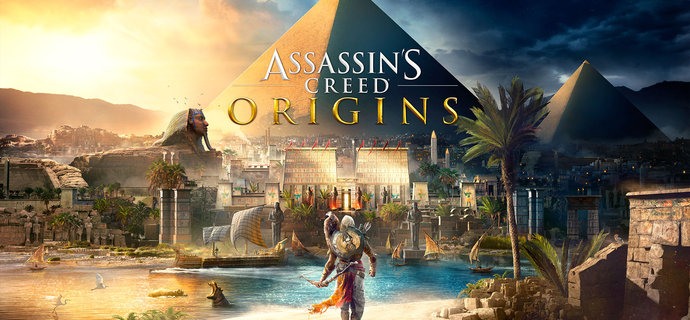Ancient Egypt is known for a lot of things - the huge and mysterious pyramids, the potentially cursed mummies, the elaborate hieroglyphics, the impressive papyrus, and the unconventional bathing methods of some of its most famous people to name but a few. With scholars still arguing over how exactly the pyramids were made, and new tombs, mummies, and treasures still being discovered to this very day, it's a time period that every single child at primary school studies, and one that's ripe for exploration, as it's packed to the brim with the ingredients for a great adventure.
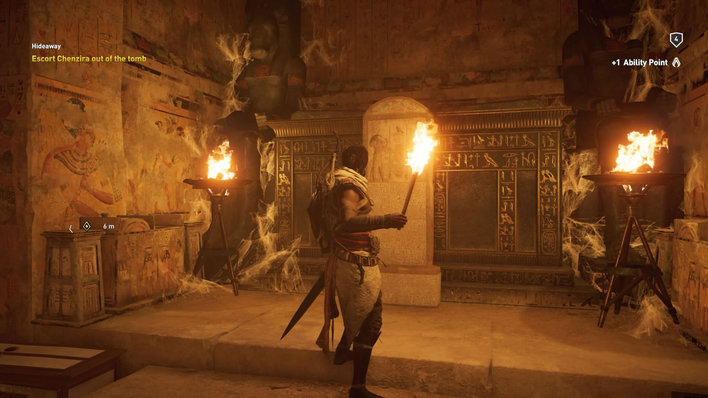
If screens like this don't make you want to play the game, you're dead inside
Adding to ancient Egypt's storied lore, Assassin's Creed Origins is a game that tells the story of one of the civilisation's less well known legends - a man named Bayek, and his mysterious teleporting camel. Providing you with a gigantic (and gorgeous) recreation of ancient Egypt to explore, it'd be wrong if Ubisoft left you to simply wander round on foot - and so you've instead been provided with some much needed transportation in the form of your trusty camel. But, in a twist that must surely be up there with the mummy's curse as one of the greatest Egyptian mysteries, Bayek too finds himself with a similar curse, as a man who has to be stealthy for a living finds himself paired with an over affectionate camel, and a forgetful player. For while the prophecies tell that pressing up on the d-pad will scan the area for any nearby collectibles, pressing down will instead summon your camel friend to your side - something that may have unintended consequences if you get confused while trying to sneak into a heavily guarded tomb, as we did...
OK, so Bayek isn't really cursed - instead, he's actually something known as a Medjay. While the game, for reasons known only to itself, takes about five hours to get around to telling you what a Medjay is, and what your purpose in the game is, it turns out the Medjay are protectors of the Pharaoh - or in the case of Bayek, the Egyptian people themselves. Kind of like an independent policeman, helping out folk in need, poor Bayek has been driven to the brink after the murder of his young son - and rather than spend his time moping, he decides to take the law into his own hands, and he seeks out the shady organisation that was responsible in order to take his revenge, one murder at a time.
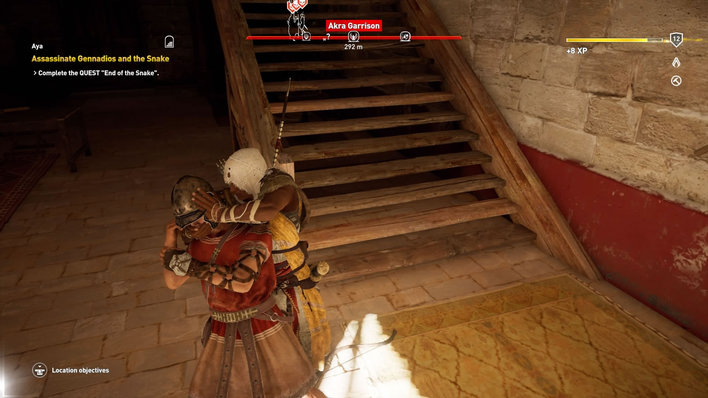
Shh. It'll all be over soon.
If we're telling the truth, though, the plot here is actually one of the most disappointing things about Assassin's Creed Origins, as it's so poorly set up and delivered. While the writing itself is fine - and in the side quests, is often quite funny - the main plot leaves you raising an eyebrow in confusion more than it leaves you on the edge of your seat, as you struggle to figure out who all these various Egyptian sounding words are, what they want, and what they're supposed to have done, as the plot jumps back and forth.
Outside of the story, though, Origins is a lot better. This is an Assassin's Creed game with confidence and polish, where everything works as you'd expect it to, and where new players are eased into their journey rather than thrown up against the wall immediately.

Boats are plentiful, and lots of fun to steal borrow. And just look at that water.
One of the most appealing things here is the quality of the world you're exploring. While open world games can be a bit hit and miss, Origins packs enough stuff in that you're never too far away from something to do - and it takes advantage of its historical setting to create some incredible vistas. The entire world is littered with collectibles too, with dozens of special areas, from sunken ships to hidden tombs scattered around, with a number of treasure chests to find in each. There's nothing phenomenally puzzley about any of the tombs - a few breakable walls, a high up ledge you'll need to reach, or some blocks that need shoving around are as tricky as it gets - but even so, this is a game that sometimes feels more like Tomb Raider than modern Tomb Raider does.
Beyond the collectibles, though, Origins offers hundreds of story quests, and side quests to be discovered, with both offering plenty of variety. Main quests see you taking Bayek on his mission of vengeance, as he attempts to track down the shady society that were responsible for his child's murder, while the side quests see you fulfilling your duty as the Medjay of the land. From rescuing some medicine from a sunken ship, to investigating a seller who's been accused of selling false mummified cats, or ensuring the safe return of a woman's drunk husband after he vanished in a drunken stupor, and got trapped on a plinth surrounded by crocodiles, there's a lot of different types of activities to get stuck into, some of which don't actually involve any combat at all, with the side quests offering most of the game's comic relief.
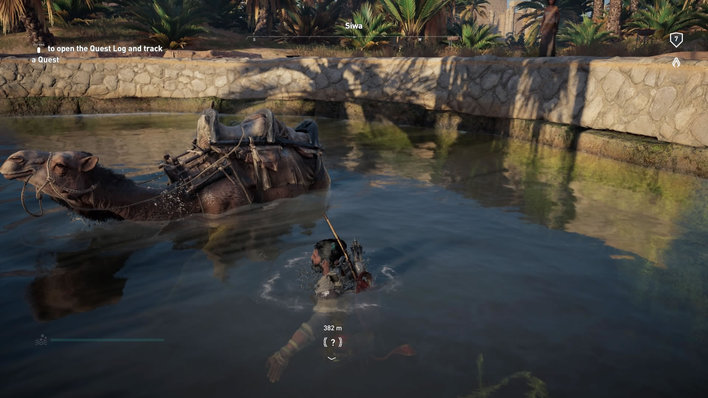
Did you know camels can swim? Us neither - but this one can
When it does come to combat, Origins plays out a little bit differently to most other action games. Like the Assassin's Creed games that came before it, Origins is a game that's intended to be played stealthily - and while that may initially put some people off, it's easier to be stealthy here than it's ever really been before. A veritable Dr Doolittle, Bayek not only has his camel friend, but he also has a pet eagle named Senu, who he can send in to scout areas in advance. Letting you "tag" any enemy soldiers you see, once they've been tagged, you're then able to "see" these soldiers through walls, letting you keep an eye on their movements, and making staying in the shadows a lot easier. A generous "you've been spotted" warning, which gives you plenty of time to get back into cover if you do arouse someone's suspicion, combines with a handy, one button stealth takedown move to make infiltrating any bases a breeze.
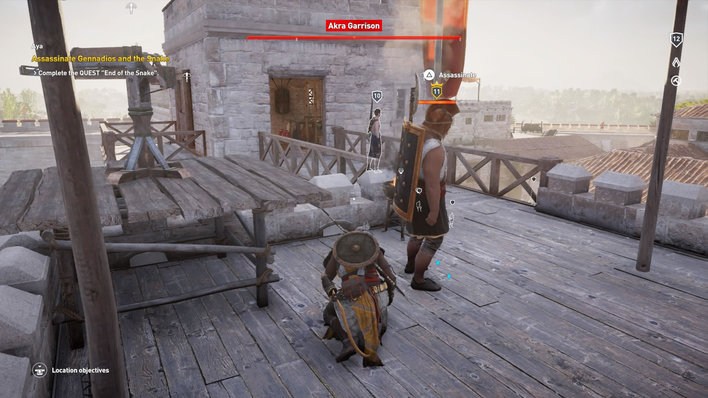
Some of the soldiers aren't the most observant of people, making sneaking up like this an approach that pays dividends
Much like the other Assassin's Creed protagonists, Bayek is a pretty nimble guy himself, having been blessed with incredible parkour skills - something that's pretty impressive, considering it isn't going to be invented for another 2000 years. Sticking to the tried and tested formula that's worked so well in recent Assassin's Creed games, it's a gimmick that makes getting around the game's world fun, as nothing is off limits. Even when it comes to infiltrating bases, this is a system that opens up so many possibilities - rather than having to sneak in a door like any other pleb, you instead get to leg it straight up vertical walls, drop down from the rafters like a bat, or dangle off ledges, shuffling around the side of a building to get around behind your quarry. The best part is, as spectacular as it looks, and as horrendous as it must have been to program, it all gels together really well, with minimal issues, as you simply press X (on the PS4) to move upwards, or Circle to go down. And unlike Zelda: Breath of the Wild, there's no limitations on what Bayek can do - he'll never get tired, or run out of grip and slide to the bottom of whatever you're climbing.
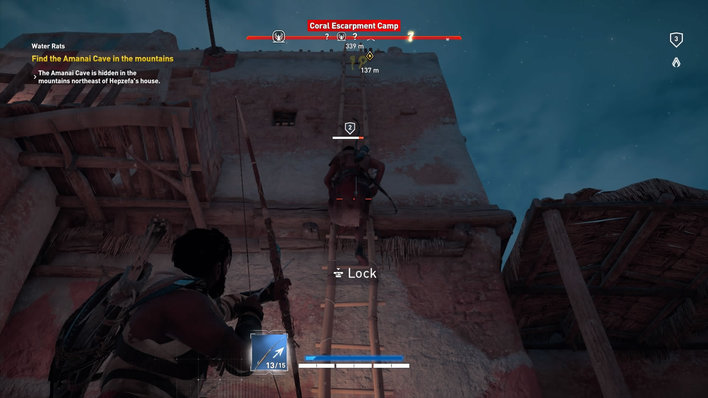
And if you do give your enemies the slip, you can always fire some arrows up their backside to boot
However, that's not to say Assassin's Creed is without issues. For one, while the game does a good job of easing new players in, with a gradually increasing difficulty level, and there are plenty of tutorials for the new features, there's surprisingly little here to tell you about the game's basics - like stealth (and what the weird blue haze means when you successfully manage to hide after being spotted), or skill points (which let you access a whole host of handy abilities). It also feels weird that your bird can tag enemies (we mean your eagle, not your wife) just by looking at them, but if you see someone while you're sneaking around a base, you have to pop up out of cover, and draw your bow at them in order to mark them out.
Equally tricky is that there's no obvious warning about "out of bounds" areas, until you actually step into them. Far too often we've ended up accidentally charging into an enemy base on our camel, simply because we were on our way somewhere else, and didn't realise it was a base until it was too late. We do wish games like this would make just a little bit of effort to get the camera to stay behind you, too, and show you where you're actually going, rather than assuming you'd rather stare off into the middle distance in an unrelated direction instead. Sadly, whether you're inside a tomb or running across the desert, the game's camera will simply stay exactly where you left it, regardless of how you change direction, meaning you can even end up running straight towards the in-game camera. There was a time when poor camera controls like this were roundly panned, but the "do it yourself" approach seems to be in vogue now. Needless to say, if you do buy the game, you'll need to keep nudging, moving and rotating the camera throughout.
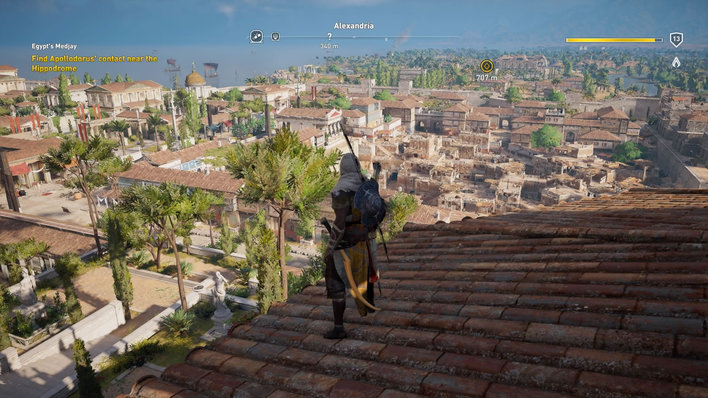
With a world this epic, we are a bit disappointed there isn't more music, though
And, as a final moan, we should note that there's also far, far too much emphasis on hunting here, with many a wild animal the game will ask you to kill. From animal lairs that are scattered around the map (like a vulture's nest, or a hyena's den), which require you to kill the head honcho animal, to the game's crafting system, which encourages you to kill almost everything you see in order to get enough resources to upgrade your equipment, so you can get more health, or deal more damage, it's an unnecessary feature, and as it doesn't add anything to the game, it can only put people off. It's nowhere near as gratuitous as the hunting found in the Far Cry games, and you can at least manage to just about get by by scavenging skins from bases, rather than hunting, but it feels out of place here to say the least. Note to Ubisoft - if I wanted to hunt animals, I'd buy a Cabella game, not Assassin's Creed.
But while its flaws may be irritating, they're infrequent enough that they don't detract too much from the main game here, with nothing so substantial a problem that it'll stop you coming back for more. With so, so much to see and do, a fantastic setting, some really refined gameplay, a smooth learning curve, and even decently sized subtitles, this is a game that has that "just one more treasure/quest/discovery" appeal in spades, and one that will keep you coming back for more.
Format Reviewed: Playstation 4

